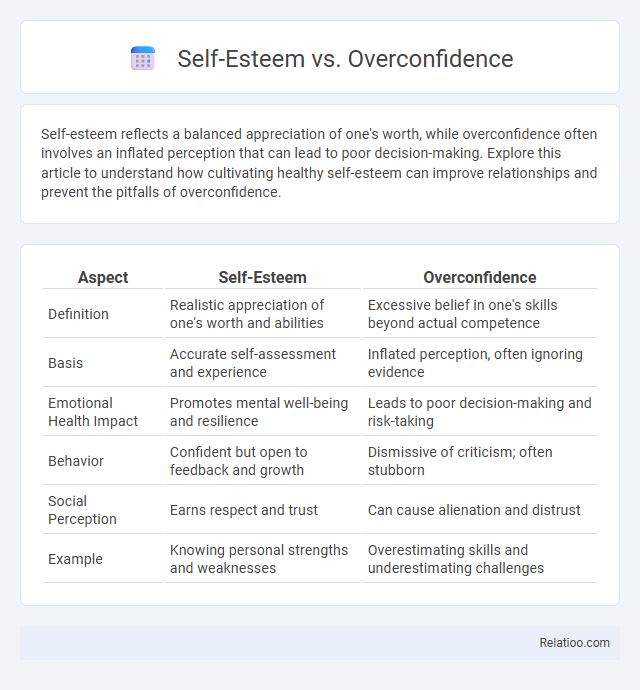Self-esteem reflects a balanced appreciation of one's worth, while overconfidence often involves an inflated perception that can lead to poor decision-making. Explore this article to understand how cultivating healthy self-esteem can improve relationships and prevent the pitfalls of overconfidence.
Table of Comparison
| Aspect | Self-Esteem | Overconfidence |
|---|---|---|
| Definition | Realistic appreciation of one's worth and abilities | Excessive belief in one's skills beyond actual competence |
| Basis | Accurate self-assessment and experience | Inflated perception, often ignoring evidence |
| Emotional Health Impact | Promotes mental well-being and resilience | Leads to poor decision-making and risk-taking |
| Behavior | Confident but open to feedback and growth | Dismissive of criticism; often stubborn |
| Social Perception | Earns respect and trust | Can cause alienation and distrust |
| Example | Knowing personal strengths and weaknesses | Overestimating skills and underestimating challenges |
Introduction to Self-Esteem and Overconfidence
Self-esteem reflects an individual's overall sense of self-worth and confidence based on realistic self-appraisal and personal achievements. Overconfidence occurs when individuals overestimate their abilities or knowledge, often ignoring potential risks or limitations. Understanding the balance between healthy self-esteem and overconfidence is crucial for accurate self-assessment and effective decision-making.
Defining Self-Esteem: Understanding Healthy Self-Perception
Self-esteem refers to an individual's realistic and positive evaluation of their own worth, grounded in self-awareness and acceptance of strengths and weaknesses. Overconfidence occurs when a person overestimates their abilities or knowledge, often ignoring potential risks and limitations. Overvaluation involves attributing excessive importance to certain traits or achievements, which can distort self-perception and hinder personal growth.
What Is Overconfidence? Key Traits and Behaviors
Overconfidence is characterized by an inflated belief in Your abilities, often leading to underestimating risks and overestimating outcomes. Key traits include excessive certainty, ignoring contrary evidence, and taking unnecessary risks. This behavior differs from healthy self-esteem and overvaluation by impairing judgment and decision-making accuracy.
Psychological Roots: Where Self-Esteem and Overconfidence Diverge
Self-esteem originates from a realistic appraisal of your personal worth, grounded in genuine achievements and positive self-regard, while overconfidence stems from cognitive biases like the Dunning-Kruger effect, where individuals overestimate their abilities despite limited evidence. Overvaluation, distinct from both, involves attributing excessive importance to certain traits or possessions, often influenced by external validation and social comparison. Understanding these psychological roots clarifies that self-esteem fosters balanced self-view, whereas overconfidence and overvaluation lead to distorted perceptions and potential interpersonal conflicts.
Signs of Healthy Self-Esteem vs Overconfidence
Healthy self-esteem is characterized by realistic self-assessment, confidence balanced with humility, and resilience in the face of failure. Overconfidence often manifests as an inflated sense of abilities, disregard for constructive criticism, and risk-taking without adequate preparation. Recognizing these signs helps differentiate genuine self-worth from excessive self-importance, enabling better personal and professional growth.
Impacts on Personal Growth and Relationships
Self-esteem fosters healthy personal growth by encouraging realistic self-assessment and resilience, whereas overconfidence often leads to risk-taking and potential failures due to inflated abilities. Overvaluation of oneself can harm relationships by creating unrealistic expectations and lack of empathy, undermining trust and effective communication. Balanced self-esteem strengthens interpersonal connections and supports continuous self-improvement through honest reflection and mutual respect.
Self-Esteem in Professional Success vs Risks of Overconfidence
Self-esteem in professional success fosters resilience, effective decision-making, and authentic leadership, driving consistent performance and growth. Overconfidence poses risks such as underestimating challenges, ignoring critical feedback, and making impulsive decisions that can jeopardize projects and team dynamics. Balancing self-esteem with realistic self-assessment is essential to leverage confidence as an asset while avoiding the pitfalls of overvaluation.
Addressing Overconfidence: Strategies for Self-Awareness
Addressing overconfidence requires cultivating self-awareness through reflective practices such as journaling and seeking honest feedback, which help identify gaps between perceived and actual abilities. Implementing mindfulness techniques can improve emotional regulation, reducing impulsive decisions driven by inflated self-assessments. Setting realistic goals and using calibrated self-assessment tools further balance confidence with objective evaluation, mitigating the risks associated with overvaluation.
Building Balanced Self-Esteem: Tips and Techniques
Building balanced self-esteem involves recognizing your true abilities without inflating them through overconfidence or overvaluation, which can distort your self-perception and decision-making. You can cultivate authentic self-worth by practicing self-reflection, setting realistic goals, and seeking constructive feedback from trusted sources to maintain a grounded perspective. Developing emotional resilience and mindfulness also helps in distinguishing between genuine confidence and inflated self-assessment, promoting healthier relationships and personal growth.
Conclusion: Cultivating Confidence Without Crossing the Line
Cultivating genuine self-esteem involves recognizing personal strengths and limitations while maintaining a realistic self-view, which fosters resilience and healthy relationships. Overconfidence often stems from an inflated perception of one's abilities, leading to risk-taking and potential failure due to underestimated challenges. Avoiding overvaluation requires continuous self-assessment and feedback to balance confidence with humility, ensuring personal growth without crossing into arrogance or denial.

Infographic: Self-esteem vs Overconfidence
 relatioo.com
relatioo.com